Challenges Help
CHALLENGES
The Challenges page is used to keep track of your challenges, whether individual, team or public challenges. To participate in a public challenge you must register.
WHO CAN CREATE A CHALLENGE?
All users can create their own individual challenges. The administrators of each team can create challenges for the whole team. Premium users can create public challenges.
TYPES OF CHALLENGES
- Virtual Race: given a type of activity and distance, the athlete who completes it with the least time is the one who wins the race. Athletes can make as many attempts as they want during the time period set in the challenge. EXAMPLE: Organize a 10K race between the whole team for a weekend. All activities over 10K that have been done will be considered for the challenge, and the one with the fastest real pace will be the winner. It should be noted that the time counted for the virtual race is the "elapsed" time, from the beginning of the activity to the end, and not just the "moving" time.
- Accumulate: Challenge won by those who are able to accumulate more (km, points, altitud gain ...) during the period established by the challenge. Accumulation challenges can have a goal to achieve (common or individual), and the application will show the percentage achieved, or can be defined without a goal, to add up as much as possible.EXAMPLE: charitable initiatives, such as the KMSxELA, where all participants, together, add kms over a period of time.
- Periodic: -- under construction --
ACTIVITY TYPE
All TriTeamApp activities can be part of a challenge. You can also define challenges just for running, or swimming, for example, by using the "activity type" field.
MINIMUM FOR ACTIVITY
The minimum per activity is used to define which activities will be considered for the challenge and which will not. For example, if you want to organize a 10K race, you must define a minimum of 10 km activity, to ensure that shorter activities are not taken into account. Accumulation challenges can also have a minimum per activity, and this does not necessarily have to be in the same units as the challenge itself. You can, for example, accumulate time, but require a minimum of 10 points per activity to be considered in the challenge.


